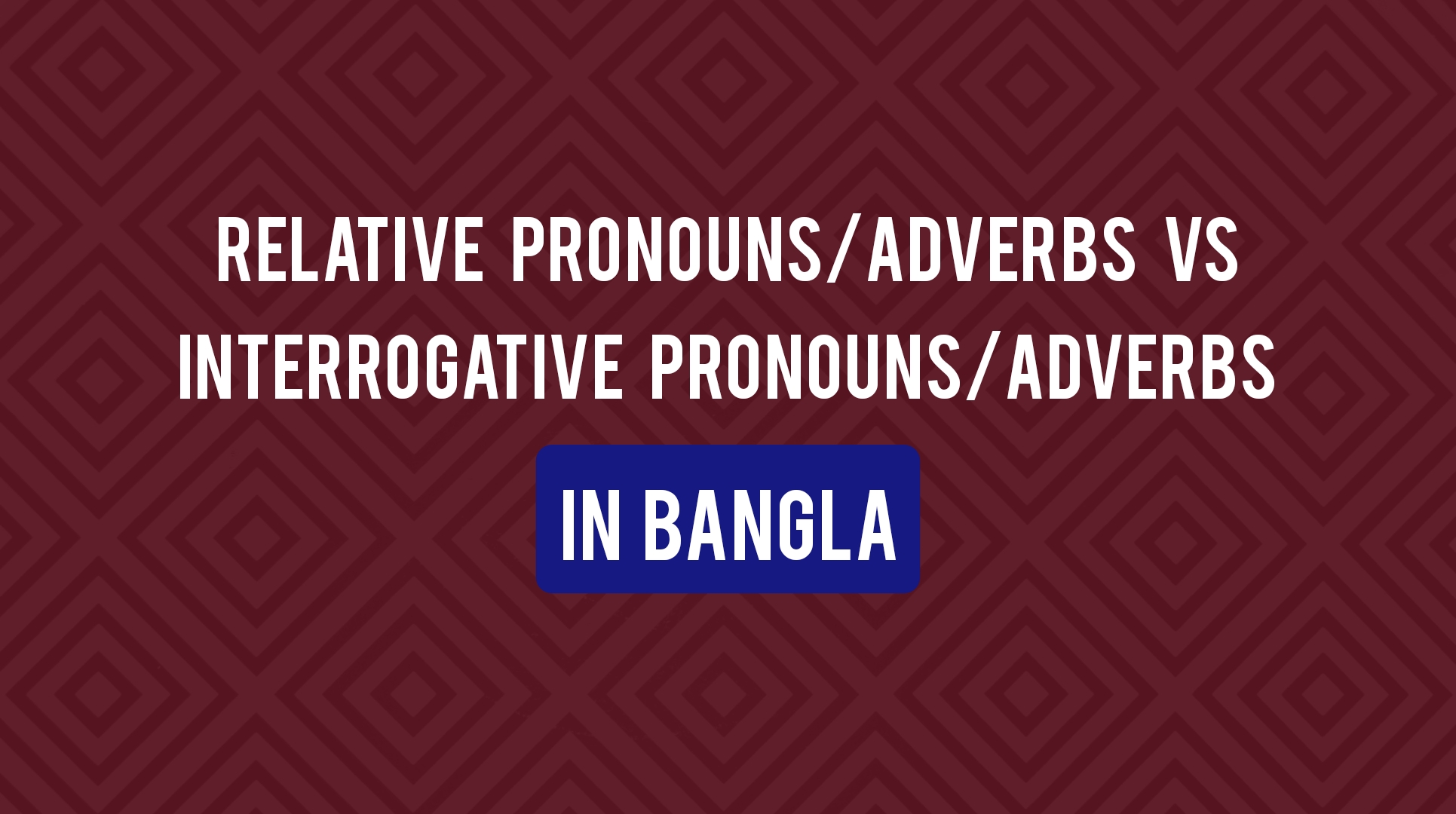Relative pronouns/adverbs VS Interrogative pronouns/adverbs in Bangla
Relative pronouns/adverbs VS Interrogative pronouns/adverbs in Bangla :
⚫ লেখক: আহসানুল ইরফান
(লেখাটা চাইলে কেউ কপি করতে পারে তবে ক্রেডিট দিতে হবে।)
________________________________________________
[][][][][][][][][][][][][][][][][][][][][][][][][][][][][][][][][][][][][][][][][]
Relative pronouns: What, who, which, that, whose, whom.
Relative adverbs: When, where, why, how.
Interrogative pronouns: What, who, which, whose, whom.
Interrogative adverbs: When, why, how, where.
Relative prns+advrbs↓--- Interrogative prn+advrbs↓
What=যা/যেগুলো।------What=কি/কোনগুলো।
Who=যে/যারা।-----------Who=কে/কারা।
Which=যেটি/যেহুলো।---Which=কোনটি/কোনগুলো।
That=যেটি/যেগুলো।----(Int prn হিসেবে ব্যবহার হয়না)
Whose=যার/যাদের।----Whose=কার/কাদের।
Whom=যাকে/যাদেরকে--Whom=কাকে/কাদেরকে।
Where=যেখানে।----------Where=কোথায়।
When=যখন।-------------When=কখন।
Why=যে জন্য।------------Why=কি জন্য।
(Those who=যারা)-------(Int prn হিসেবে ব্যবহার হয়না)
How=যেভাবে।------------How=কিভাবে।
Note: These, those কখনো Relative pronoun হিসেবে ব্যবহার হয় না←অনেকে এ ভুলটি করে। Those শুধু "যারা/ঐগুলো" এবং These শুধু "এরা/এগুলো" অর্থ দেয়।
Relative pronoun/adverb হিসেবে ঐসকল pronouns/adverb এর ব্যবহার :
যে বইগুলো ভালো, সেগুলো নিয়ে আসো।
= Bring here the books that are good. ✔
(ব্রিং হেয়ার দা বুক্স দ্যাট আর গুড।)
= Books that are good, bring here. ✔
(বুক্স দ্যাট আর গুড, ব্রিং হেয়ার।)
= Books those are good, bring here. ❌
(Bring here the good books বলা উত্তম, ওপরেরগুলো শুধুমাত্র উদাহরণ হিসেবে দেয়া হয়েছে।)
যে বইগুলো ভালো সেগুলো নিয়ে আসো।
= Bring here the books which are Sentences. (ব্রিং হেয়ার দা বুক্স হুইচ আর গুড।)
= Those books are good, bring here. ❌
= Bring here those books are good. ❌
= Bring here which books are good. ❌
(Bring here the good books বলা উত্তম, ওপরেরগুলো শুধুমাত্র উদাহরণ হিসেবে দেয়া হয়েছে।)
________________________________________________
Interrogative pronoun/adverb হিসেবে :
যখন Who/ Which/ Whose/ when … Interrogative pronoun/adverb হিসেবে ব্যবহার করা হয় তখন Auxiliary
Verb Subject এর আগে বসবে।
আর Auxiliary verb না থাকলে Do/ Does/ Did ব্যবহৃত হয়।
(Subject Third person singular হলে Does হয়।)
তুমি কোথায় যাচ্ছ?
= Where are you going? ✔ (হয়ার আর ইউ গোয়িং?)
= Where you are going? ❌
= তুমি কোন বই পড়ছো?
= What book are you reading? ✔ (হয়াট বুক্স আর ইউ রিডিং?)
= What book you are reading? ❌
(What book you are reading = তুমি যে বই পড়ছো।)
আমি যায়
= I go.
আমি কোথায় যাই?
= Where I go? ❌
= Where do I go? ✔ (হয়ার ডু আই গো?)
________________________________________________
Sentences :
Where I live. = আমি যেখানে বসবাস করি।
Where do I live. = আমি কোথায় বসবাস করি।
Where you are going. = তুমি যেখানে যাচ্ছ।
Where are you going. = তুমি কোথায় যাচ্ছ।
যে জায়গায় আমি বসবাস করি।
= There place where I live. ✔ (দা প্লেছ হয়ার আই লিভ।)
= The place where do I live. ❌
কিন্তু অনেক ক্ষেত্রে আগে পরে করার প্রয়োজন হয় না।
যেমন :
Who is the culprit? (হু ইছ দা কালপ্রিট?) = কে আসামি?
I'll kill the guy who is the culprit. (আই উইল কিল দা গাই হু ইছ দা কালপ্রিট।) = যে আসামি আমি তাকে মেরে ফেলব।
উভয় sentence-এ "who is" common অর্থাৎ এখানে আগে পরে করার প্রয়োজন হয়নি।
My son who is 19 now told me that I'm was being dishonest.
I'll kill who did it. ❌
I'll kill the guy who did it. ✔ (আই উইল কিল দা গাই হু ডিড ইট।)
I'll kill who is the culprit. ❌
I'll kill the guy who is the culprit. ✔ (আই উইল কিল দা গাই হু ইছ দা কালপ্রিট।)
I'll kill the guy is culprit. ❌
আমি জানি না এটাকে কী বলে ডাকা হয়।
= I don't know what it is called. ✔ (আই ডোন্ট নো হয়াট ইট ইছ কল্ড।)
= I don't know what is it called. ❌
যদিও বাংলায় "কি" আছে।
আমি জানি না এটাকে কী বলে ডাকা হয় যেটার ওপর সে বসে আছে
= I don't know what it is called that he is sitting on. ❌
= I don't know what it is called the thing that he is sitting on. ✔ (আই ডোন্ট নো হয়াট ইট ইছ কল্ড দা থিং দ্যাট হি ইছ ছিটিং অন।)
এভাবে সবগুলোই।



No comments